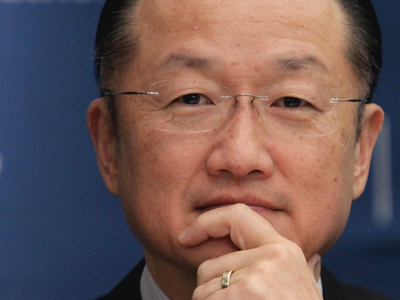DEVELOPMENT BUZZ
World Bank reform: Keep your head down and just wait?

World Bank President Jim Yong Kim. Can his ambitious reform plan work? Photo by: CSIS | Center for Strategic & International Studies / CC BY-NC-SA
Reform is good, but the devil, as they say, is always in the details.
The World Bank is undergoing reorganization, orchestrated by its president, Jim Yong Kim. The ambitious plan is a work in progress, with the final strategy to be presented at the World Bank annual meeting in October.
The news has, unsurprisingly, evoked strong reactions from within the aid community. Last week, in response to a feature by Devex Global Development Reporter Michael Igoe, the discussion extended beyond the Devex website and onto social media.
Kim’s desire to put his own stamp on the bank isn’t surprising, wrote Michael Philips via Facebook.
“Every World Bank president tries to reform the bank in some way and they all seem to have at least partial success. Every large institution has bureaucratic problems and needs fresh organizational ideas from time to time,” he observed. “But in my experience working with bank staff on projects in the field, I have found them to be extremely bright, knowledgeable and motivated. Granted, the folks I deal with are not senior managers and are fairly low on the bank’s totem pole, but they’re the ones who run the projects in the countries and in my experience they do it well despite all the procedures or internal fiefdoms they may have to deal with.”
Rafael Pablo Molina Fernando, a quality associate at Quality Partners Co., had a similarly optimistic take on the reform process, which he called “awesome” yet “not impossible.”
He added: “The road to excellence is really the road less traveled. Perhaps, it is time for the World Bank to change their mission-vision and make it more customer-focused, internally and externally.”
A spirited discussion has been underway on the Devex LinkedIn page.
Elvira Beracochea, CEO of global health consulting group Midego, offered several suggestions: Simplify how the bank works, set targets for the delivery of services and reduction of poverty, and make staff accountable for improving the lives of at least 1,000 people.
“Each bank employee is very expensive and there should be a tangible return on investing on each employee,” she argued.
In response, Linn Hammergren, an independent consultant who used to work at the multilateral body, pointed out that the bank is not a humanitarian or community development agency.
Hammergren wrote: “Whatever the bank’s flaws it focuses on development of national economies (including poverty reduction) and the theory is that this is best done, not person by person but with larger projects with collective benefits. Since you [referring to Beracochea] work in health, I would assume that the kind of project in which you might be involved — building better service delivery systems, improving medical education and research capacity in-country, checking the ‘leakage’ of supplies and funds to other purposes — I suppose some of this, but not all, is susceptible to headcounts of beneficiaries, but the additive approach to measuring impact has its limits.”
For her part, Hammergren said she could probably come up with 200 areas that need addressing, but singled out the lack of technical expertise and huge back office as those that need the most attention. She agreed with the article’s observation that defining the bank’s purpose in the 21st century presents the biggest issue. This, she noted, hinges on two factors, its financing and the role of bank members.
“If its main business is making loans, it could ditch 90 percent of its staff; if its business is development, well some will have to go, but who stays and how will they be funded?” she asked. “The sudden departure of [top bank officials Pamela] Cox and [Caroline] Anstey is interesting but probably a result of issues not affecting the larger question (however, as a victim of the decisions of both, well I can’t say I am unhappy).”
So what is the bank’s mission, anyway? Beracochea suggested that it’s in line with Kim’s bold pledge to help eradicate extreme poverty by 2030. Hammergren disagreed, citing the bank’s articles of agreement in arguing that its goal is to promote economic growth and development.
Tom Ward, a business coach for international financial economics and strategy at TW Consult, chimed in that there’s a difference between the bank’s goals and mandate.
Hammergren responded: “I was only objecting to the Elvira’s statement (possibly not intended this way) that poverty reduction was where it starts — which it is not — and tomorrow or under a new president, that part may shift as well.”
The bank’s “glossy publication” outlines several goals, she said, but “the real challenge will be advancing any of them.”
Beracochea then highlighted the importance of consensus at the bank, pointing to the “About” section of the World Bank website. Without consensus among staff, she argued, the bank’s impact will be limited.
Several readers praised Kim’s resolve to improve the bank’s ability to learn from failure, but Hammergren said she won’t be holding her breath.
“The survivors in the WB,” she said, “have learned to keep their heads down, adopt the jargon, and just wait.”
The conversation on the Devex LinkedIn page continues, and we invite you to join and share your views on changes at the World Bank. Or, reread the article which kicked off the debate, “Change is coming to the World Bank… or is it,” and have your say using the comment box below it.

Nessun commento:
Posta un commento